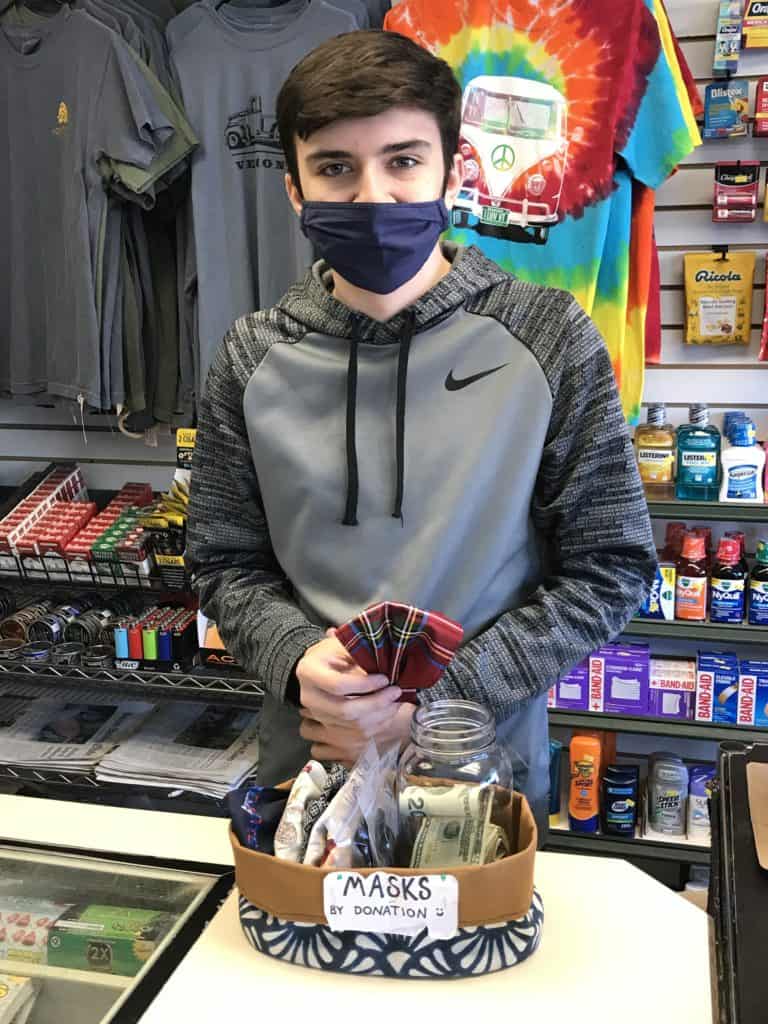
Logan LaDouceur, 17, delivers the home-made masks.
By Curt Peterson
A sign on the door at BG’s Market in Hartland reads, “Masks required,” and just about everyone entering the popular store cooperates within the Vermont-mandated request. There are a few customers, usually young males, who, for one reason or another, either feel the virus-control rule doesn’t apply to them —or they forgot. They enter bare-faced.
The cloth masks require regular laundering, which, in turn, means replacing.
BG’s has an answer for those that forgot theirs or need a replacement.
On their counter, next to a basket of home-made donuts, is a small cloth container with its own sign: “Masks —by donation.”
On Sunday, Jan. 24, it was bulging with a fresh delivery of hand-sewn, double-layer, printed on one side, black on the other, Covid-19 face coverings with black ear elastics at both ends. The open Mason jar welcomed donations and a $20 bill rested on the top of several other contributions.

A fresh delivery of hand-sewn, double-layer, colorful masks made by Jamie LaDouceur, are at BG’s Market in Hartland.
Logan LaDouceur, 17, and a student at Hartford High School, worked the register at BG’s that Sunday afternoon. He also delivers the home-made masks for his mother, Jamie.
So far, the Barnard native estimates she’s crafted more than 2,500 masks. She believes her masks have been a positive, albeit small, part of Vermont’s relatively successful containment of the virus.
The average donation is about $1.50, which covers the approximate cost of materials in each mask. Besides material cost, she has worn out one sewing machine and had to purchase a replacement.
“I originally wanted to make them for free,” Jamie said, “but it just got too expensive. The donations are just enough to make it possible.”
She was inspired to make the masks in June when Logan and his sister, Camie, 21, a student at St. Michael’s College, announced their part-time jobs required they wear facial coverings. Camie works summers scooping ice cream at Vermont Creamery in Woodstock. Jamie felt it wasn’t fair when the customers they served didn’t wear masks, and a solution was to make them available at the register.
“I promised I would make them for their workplaces until Camie and Logan didn’t have to wear them anymore,” she laughed. “It looks like that’s going to be quite a while longer.”
It takes Jamie about 10 minutes to make each mask.
“I call it a form of therapy,” she said.
In the beginning Camie and Logan helped by cutting out the fabric and elastic pieces according to a pattern distributed by Dartmouth-Hitchcock Medical Center. Most of the components come from JoAnn Fabrics, but local residents donate some of the materials as well.
She makes three sizes – large, medium and small – and some “customers” make special requests via notes in the donation jar or send messages with Logan.
“All the feedback has been positive,” Jamie said. “Cute notes, thank-you’s, etc.”




